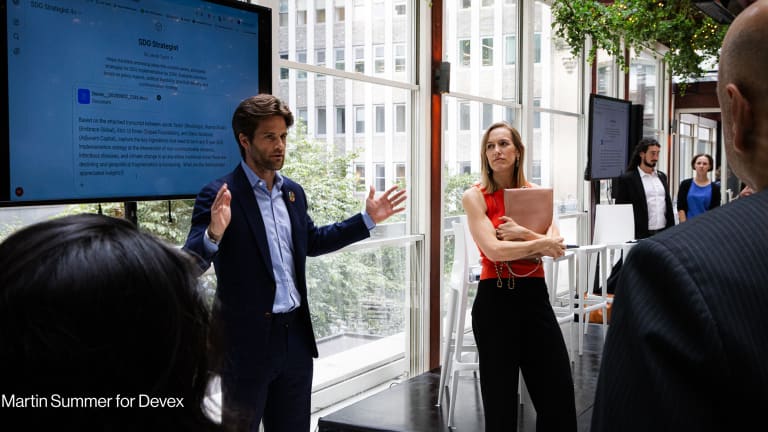
EDITOR’S NOTE: Cash on delivery aid offers two benefits, according to Nancy Birdsall, president of the Center for Global Development. It pays against measurable outcomes, prompting recipient countries to address systemic issues, and it promotes transparency, she adds.
Bill Easterly struck a chord with his recent Aid Watch post on development being about problem-solving systems not “direct solutions to problems”.
I couldn’t help thinking: A-ha – another argument for the merits of Cash on Delivery Aid (aka #CODAid on twitter). Here are two reasons why (I could think of more… .) .
First because COD Aid doesn’t pay for inputs (teachers trained/medicines procured/health clinics built, roads paved, cash transfers to parents made, tax collection agents trained, agricultural extension initiated, etc. etc.). It pays against measurable progress on a single clear outcome (like more kids finish school/fewer babies die). Instead of funding inputs it leaves to the recipient country/government/society to address systemic problems (teachers aren’t paid enough? Roads are impassable and bus system unreliable? Deputy Minister spends all her time on her own business affairs? Corruption in procurement of pharmaceuticals? De-worming needed? Etc. etc. ) Funders after all don’t understand the local “system” (politics and power relations/history and institutions). Put another way, the outside funder doesn’t know the production function for any particular good outcome, because systems are complex, dynamic and inherently local. Recipient government and citizens may not either, of course, but they bear the responsibility and face the risks of failing – and have the inherent incentives to work at figuring it out. In the United States we still haven’t figured out what to do about our “system” of schooling – but citizens and taxpayers and technocrats and public servants (and for that matter Bill Gates as in the Washington Post story today) keep trying.
Working it out is development… transformation of the system is the point. Outside funders want measurable outcomes (as in the Millennium Development Goals). COD Aid allows them to pay for what they want: measurable and audited outcomes. But at the same time it liberates the recipient government to search (Bill Easterly’s favorite word), discover, experiment, learn, fail or succeed year to year (we like a minimum five-year contract).
Second, COD Aid builds in transparency to help make recipient governments accountable, via feedback (another favorite Bill Easterly word) from citizens.
It also helps the official donors (it locks them in – they happily tie their hands) on their promises: coordination! Predictability! Harmonization! Paris Declaration realized! They can partner with private funders!
Now that Kristof and the Economist have called for it, and Andrew Mitchell, the new development minister in the UK, among others has endorsed it, and the governments of Malawi, Liberia, Tanzania, and the African Development Bank and the World Bank have asked about it, and the Clinton Health Access Initiative wants to broker it… we think it will happen.
Then let’s hope someone funds a local research and policy institution in the recipient country to do what we call a process evaluation and learn about their system, their complementarities, their dynamic processes, and their own development transformation.
Re-published with permission by the Center for Global Development. Visit the original article.
Search for articles
Most Read
- 1
- 2
- 3
- 4
- 5








